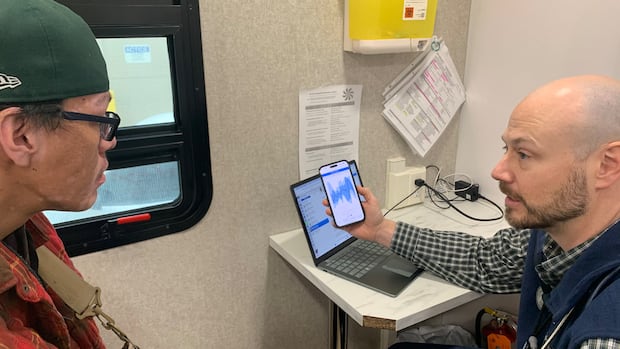Health
Mobile Clinic Revolutionizes Diabetes Care for Vulnerable Patients

A mobile clinic in Calgary is transforming diabetes care for vulnerable populations, including those experiencing homelessness and low-income individuals. This initiative, often referred to as the diabetes bus, provides essential medical services directly to patients who face barriers to traditional healthcare.
Inside his Calgary apartment, 34-year-old Jeremy Auger shared his recent struggles with managing his blood sugar levels. As a patient with late-onset Type 1 diabetes, Auger relies on careful monitoring of his carbohydrate intake. He expressed concern over the high-carb food items he received from a local charity. Until he began visiting the mobile clinic, Auger noted that his blood sugar readings were inconsistent and challenging to control.
The bus, which operates in collaboration with The Alex Community Health Centre, brings specialized diabetes care to those who typically lack access. According to Dr. David Campbell, an associate professor at the University of Calgary’s Cumming School of Medicine, individuals without stable housing often miss out on the high-quality care necessary to prevent severe complications such as amputations, kidney failure, and heart disease.
Healthcare professionals on the mobile unit provide a range of services, including foot care, retinal scans, and blood and urine screenings, with results available within minutes. Additionally, staff assist patients in accessing dietary resources and connecting them with housing or counseling programs. Registered nurse Erin Dartnell emphasized, “We’re a one-stop-shop,” highlighting the clinic’s comprehensive approach to care.
Diabetes is a significant health concern in Canada, affecting approximately 10 percent of the population. This figure is projected to increase over the next nine years, according to data from Diabetes Canada. Research led by Dr. Campbell indicates that those experiencing homelessness face a heightened risk of diabetes-related complications and mortality compared to those with stable housing.
Every Wednesday, the mobile clinic’s staff typically sees between five and ten patients, some scheduled and others walk-ins. Lindsay Huard, who facilitates patient access to community resources, explained the importance of meeting clients where they are. This approach marks a shift for patients like Auger, who previously received intermittent care and struggled to maintain consistent appointments.
With the support of the mobile clinic, Auger has stabilized his blood sugar levels thanks to adjustments in his insulin medication and dietary guidance. He no longer worries about the cost or logistics of traveling to multiple healthcare appointments, as most of his needs can be met on-site. “It’s pretty awesome. It’s just easier than going all the way down to where we usually go to get the care we need,” he remarked.
The mobile diabetes clinic is currently in the second year of a two-year pilot project funded through grants and donations. Dr. Campbell recently announced that additional funding will extend the pilot for another 18 to 24 months beyond July 2026. His vision includes integrating the mobile unit into the broader healthcare system.
Dr. Kaberi Dasgupta, a physician and researcher at McGill University, pointed out the significant gap in diabetes care for individuals without stable housing, calling for more systemic changes. She cautioned against allowing successful pilot projects to stagnate, stating, “We can’t let those pilot projects be kind of like a dead-end road.”
While mobile clinics for various health services exist in Canada, the diabetes bus represents a focused effort to address a critical need. As the initiative continues to evolve, its impact on community health and patient outcomes remains a point of interest for healthcare professionals and researchers alike.
-

 World4 months ago
World4 months agoScientists Unearth Ancient Antarctic Ice to Unlock Climate Secrets
-

 Entertainment4 months ago
Entertainment4 months agoTrump and McCormick to Announce $70 Billion Energy Investments
-

 Lifestyle4 months ago
Lifestyle4 months agoTransLink Launches Food Truck Program to Boost Revenue in Vancouver
-

 Science4 months ago
Science4 months agoFour Astronauts Return to Earth After International Space Station Mission
-

 Technology2 months ago
Technology2 months agoApple Notes Enhances Functionality with Markdown Support in macOS 26
-

 Top Stories3 weeks ago
Top Stories3 weeks agoUrgent Update: Fatal Crash on Highway 99 Claims Life of Pitt Meadows Man
-

 Sports4 months ago
Sports4 months agoSearch Underway for Missing Hunter Amid Hokkaido Bear Emergency
-

 Politics3 months ago
Politics3 months agoUkrainian Tennis Star Elina Svitolina Faces Death Threats Online
-

 Technology4 months ago
Technology4 months agoFrosthaven Launches Early Access on July 31, 2025
-

 Politics4 months ago
Politics4 months agoCarney Engages First Nations Leaders at Development Law Summit
-

 Entertainment4 months ago
Entertainment4 months agoCalgary Theatre Troupe Revives Magic at Winnipeg Fringe Festival
-

 Top Stories1 week ago
Top Stories1 week agoFamily Remembers Beverley Rowbotham 25 Years After Murder





















